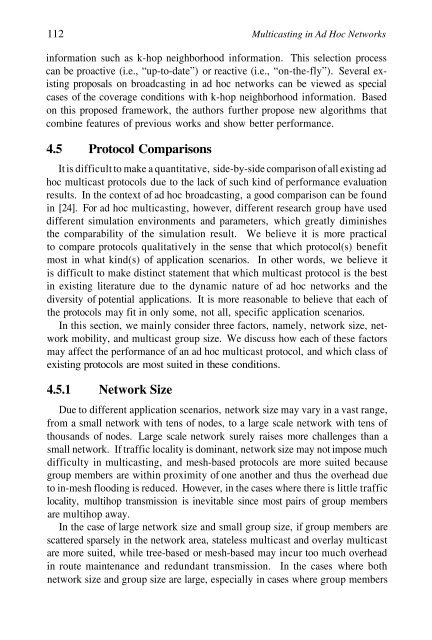Ad Hoc Networks : Technologies and Protocols - University of ...
Ad Hoc Networks : Technologies and Protocols - University of ...
Ad Hoc Networks : Technologies and Protocols - University of ...
Create successful ePaper yourself
Turn your PDF publications into a flip-book with our unique Google optimized e-Paper software.
112 Multicasting in <strong>Ad</strong> <strong>Hoc</strong> <strong>Networks</strong><br />
information such as k-hop neighborhood information. This selection process<br />
can be proactive (i.e., “up-to-date”) or reactive (i.e., “on-the-fly”). Several existing<br />
proposals on broadcasting in ad hoc networks can be viewed as special<br />
cases <strong>of</strong> the coverage conditions with k-hop neighborhood information. Based<br />
on this proposed framework, the authors further propose new algorithms that<br />
combine features <strong>of</strong> previous works <strong>and</strong> show better performance.<br />
4.5 Protocol Comparisons<br />
It is difficult to make a quantitative, side-by-side comparison <strong>of</strong> all existing ad<br />
hoc multicast protocols due to the lack <strong>of</strong> such kind <strong>of</strong> performance evaluation<br />
results. In the context <strong>of</strong> ad hoc broadcasting, a good comparison can be found<br />
in [24]. For ad hoc multicasting, however, different research group have used<br />
different simulation environments <strong>and</strong> parameters, which greatly diminishes<br />
the comparability <strong>of</strong> the simulation result. We believe it is more practical<br />
to compare protocols qualitatively in the sense that which protocol(s) benefit<br />
most in what kind(s) <strong>of</strong> application scenarios. In other words, we believe it<br />
is difficult to make distinct statement that which multicast protocol is the best<br />
in existing literature due to the dynamic nature <strong>of</strong> ad hoc networks <strong>and</strong> the<br />
diversity <strong>of</strong> potential applications. It is more reasonable to believe that each <strong>of</strong><br />
the protocols may fit in only some, not all, specific application scenarios.<br />
In this section, we mainly consider three factors, namely, network size, network<br />
mobility, <strong>and</strong> multicast group size. We discuss how each <strong>of</strong> these factors<br />
may affect the performance <strong>of</strong> an ad hoc multicast protocol, <strong>and</strong> which class <strong>of</strong><br />
existing protocols are most suited in these conditions.<br />
4.5.1 Network Size<br />
Due to different application scenarios, network size may vary in a vast range,<br />
from a small network with tens <strong>of</strong> nodes, to a large scale network with tens <strong>of</strong><br />
thous<strong>and</strong>s <strong>of</strong> nodes. Large scale network surely raises more challenges than a<br />
small network. If traffic locality is dominant, network size may not impose much<br />
difficulty in multicasting, <strong>and</strong> mesh-based protocols are more suited because<br />
group members are within proximity <strong>of</strong> one another <strong>and</strong> thus the overhead due<br />
to in-mesh flooding is reduced. However, in the cases where there is little traffic<br />
locality, multihop transmission is inevitable since most pairs <strong>of</strong> group members<br />
are multihop away.<br />
In the case <strong>of</strong> large network size <strong>and</strong> small group size, if group members are<br />
scattered sparsely in the network area, stateless multicast <strong>and</strong> overlay multicast<br />
are more suited, while tree-based or mesh-based may incur too much overhead<br />
in route maintenance <strong>and</strong> redundant transmission. In the cases where both<br />
network size <strong>and</strong> group size are large, especially in cases where group members

















